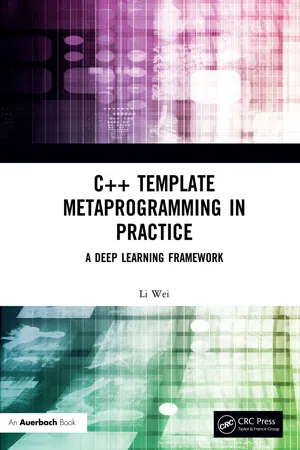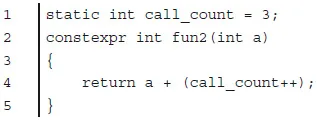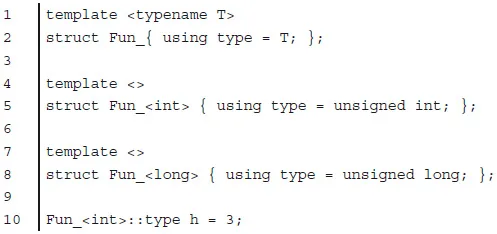
- 310 pages
- English
- ePUB (mobile friendly)
- Available on iOS & Android
About this book
Using the implementation of a deep learning framework as an example, C++ Template Metaprogramming in Practice: A Deep Learning Framework explains the application of metaprogramming in a relatively large project and emphasizes ways to optimize systems performance. The book is suitable for developers with a basic knowledge of C++. Developers familiar with mainstream deep learning frameworks can also refer to this book to compare the differences between the deep learning framework implemented with metaprogramming and compile-time computing with deep learning frameworks using object-oriented methods.
Consisting of eight chapters, the book starts with two chapters discussing basic techniques of metaprogramming and compile-time computing. The rest of the book's chapters focus on the practical application of metaprogramming in a deep learning framework. It examines rich types and systems, expression templates, and writing complex meta-functions, as well as such topics as:
- Heterogeneous dictionaries and policy templates
- An introduction to deep learning
- Type system and basic data types
- Operations and expression templates
- Basic layers
- Composite and recurrent layers
- Evaluation and its optimization
Metaprogramming can construct flexible and efficient code. For C++ developers who are familiar with object-oriented programming, the main difficulty in learning and mastering C++ metaprogramming is establishing the thinking mode of functional programming. The meta-programming approach involved at compile time is functional, which means that the intermediate results of the construction cannot be changed, and the impact may be greater than expected. This book enables C++ programmers to develop a functional mindset and metaprogramming skills. The book also discusses the development cost and use cost of metaprogramming and provides workarounds for minimizing these costs.
Tools to learn more effectively

Saving Books

Keyword Search

Annotating Text

Listen to it instead
Information
INTRODUCTIONI
Basic Tips
1.1Metafunction and type_traits
1.1.1Introduction to Metafunctions


1.1.2Type Metafunction
| |

- The input is the information of a type T and passes to the Fun_ template as a template parameter;
- The output is an internal type of the Fun_ template, which is Fun_<T>:: type;
- The mapping is embodied in the transformation logic implemented by the template through specialization: if the input type is int, the output type is unsigned int, and so on.
Table of contents
- Cover
- Half Title
- Title
- Copyright
- Contents
- Preface
- Acknowledgment
- PART I INTRODUCTION
- PART II THE DEEP LEARNING FRAMEWORK
- Postscript
- Index
Frequently asked questions
- Essential is ideal for learners and professionals who enjoy exploring a wide range of subjects. Access the Essential Library with 800,000+ trusted titles and best-sellers across business, personal growth, and the humanities. Includes unlimited reading time and Standard Read Aloud voice.
- Complete: Perfect for advanced learners and researchers needing full, unrestricted access. Unlock 1.4M+ books across hundreds of subjects, including academic and specialized titles. The Complete Plan also includes advanced features like Premium Read Aloud and Research Assistant.
Please note we cannot support devices running on iOS 13 and Android 7 or earlier. Learn more about using the app